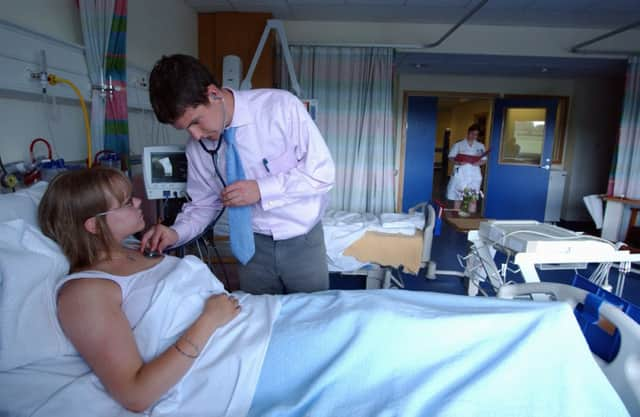Doctors ‘under intolerable pressure by bed cuts’


Dr Neil Dewhurst, the outgoing president of the Royal College of Physicians of Edinburgh (RCPE), also claimed the number of hospital beds being occupied now “commonly exceeds” what is regarded as the maximum safe level.
He said occupancy rates in some areas had reached as high as 124 per cent last year as he insisted it was “essential” for the health service to commit to having a maximum occupancy rate of 85 per cent.
Advertisement
Hide AdAdvertisement
Hide AdThe consultant cardiologist went on to call for “more stringent standards” for the quality of care to be brought in, as happened south of the Border following the problems identified in Mid Staffordshire.
While Dr Dewhurst stressed there was “much to be proud of in the NHS in Scotland”, he added that in recent years “a variety of pressures have built up in our hospitals which are now seriously impacting upon our ability to deliver the quality of care that patients require”.
Dr Dewhurst, who stands down as RCPE president at the end of this week, said problems in the health service had most recently been seen in NHS Lanarkshire – which was last year told a range of improvements must be made at three hospitals, following a review into patient safety prompted by higher than average mortality rates.
But he said these problems “could just as easily have happened elsewhere”.
Dr Dewhurst said: “Reductions in the numbers of acute beds while medical admissions have continued to rise, in parallel with workforce shortages, have placed almost intolerable pressure on our doctors and nurses.”
The NHS has deployed a number of “coping strategies” to deal with this, Dr Dewhurst said, but he added that while these were “only ever intended as crisis management tools”, they were now “in real danger of becoming accepted daily practice”.
He said the practice of moving patients between wards because of overcrowding – known as boarding – was “only intended for times of severe pressure, such as ward closures and outbreaks of norovirus or flu”.
But he said this had now become “established practice in many Scottish hospitals on a year-round basis”. While he welcomed a recent pledge from the Scottish Government to end this “discredited practice”, Dr Dewhurst said efforts to do this must be stepped up.
Advertisement
Hide AdAdvertisement
Hide Ad“Boarding continues in our hospitals and efforts need to be accelerated to reduce it,” he said.
A Scottish Government spokesman said the government had “protected investment in the NHS” with “increasing staffing levels and putting patient safety at the heart of absolutely everything we do” and he added: “Health resources in Scotland are at a record high of £11.8 billion.
“By 2015-16, there will have been an increase in our resource spending of £2.1bn since 2007.”